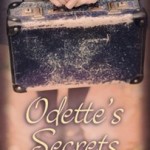
Award-winning Children’s Author
Usually authors write about topics that are within their comfort zone and/or area of expertise. Obviously, the learning curve is very steep when an author ventures into unfamiliar territory. The end product oftentimes may suffer as a result. This is especially true of multicultural literature. Some literacy experts dismiss literature that is written by “outsiders.” See Agendas and Multicultural Literature. Thus, it is unusual to find an award-winning author that deviates from the norm. Maryann Macdonald is one positive example. Even though she is not Jewish, she wrote an amazing Holocaust story, Odette’s Secrets. This chapter book is based on the childhood experiences of a French Holocaust survivor. It was listed among the Best Children’s books of 2013 by Kirkus and The Tablet, and was also named a 2014 Sydney Taylor Notable book.
Today, I welcome Maryann Macdonald to this website.
On the front page of your website, you state- “ Stories are where my heart is. Stories can save us.” How do you put your heart into your stories? How do stories save us?
My heart is the source of my stories. When I am touched by a subject so much so that I can’t let go of it , I know I have the beginnings of a story. I then strive to understand my subject and to express my understanding of it in a form that others may also appreciate…in a story. When that story then touches the hearts of readers, it helps create more compassion and understanding in the world.
You have had a successful writing career that has included the publishing of more than 25 books. From the time you started writing your first book until the present, can you identify 3 things that have changed in world of children’s books? Was it necessary to change anything in order to adapt?
The first thing is the actual writing, which when I started was all done on a typewriter. It was a painstaking process simply to produce a manuscript free enough of typographical errors to submit to a publisher! With computers, it’s easier to do that, and MUCH easier to revise.
Second, everything was submitted by mail. It took weeks, maybe months, to hear back about your work, but you almost always did. You mailed it in and eventually you would receive in return a hand-signed letter from the editor to whom you’d sent it. I would usually contain at least a sentence or two of feedback. Now you may never hear anything from anyone.
Third, today you are expected to promote your own books through social media and other outlets. At the very least, you must have some sort of website, and preferably a “platform” to publicize your book. You may not have gotten much promotion back in the old days, but you weren’t expected to do it all by yourself.
Many more things have changed; these are just the first three that spring to mind. But yes, of course, we all need to move with the times and not just dig our heels in and resist the way of the world.
All writers experience setbacks. Some are in the form of writer’s block, while others are in response to book proposal rejections. Can you suggest 3 strategies to overcome these common obstacles?
When I turned 40 years old, I began playing basketball for the first time with a group of other middle-aged women. Our coach was from the Caribbean, and he was marginally handicapped, walking with a limp. But he was inspirational and encouraging. His constant advice to us? “Believe in yourself.” This applies as much to shooting baskets as to handling writer’s block and rejection, I think, so I’ll place it at the top of my list
- Believe in yourself.
- Stay connected to the world of reading and writing, whether through a writer’s support group, volunteering in a school or library, or just reading on your own or with others.
- Don’t give up.
Odette’s Secrets stands out from your previous publications. Why did you decide to shift your focus so dramatically?
People say this about Odette’s Secrets, but I don’t see the book as a departure, more as a progression. In a way, I see the subject of most of my books as being the same. They are almost always about the saving power of love.
It’s true that Odette’s Secrets is longer than most of my books, but it is not my first novel and I have written other chapter books. Some are now out-of-print and no longer available.
In your Author’s Note you provide background information about your decision to write a story that was based on a Jewish girl who lived in Paris during the Nazis occupation. Can you briefly share with my audience why you chose to research and write this story?
When living in Paris some years ago, I learned that 86% of French Jewish children survived the Holocaust by “hiding in plain sight.” How in the world were they able to do this so successfully, I wondered? I wanted to tell their story, and when I found “Doors to Madame Marie,” the autobiography of one of these children, I felt I had discovered the perfect vehicle for this.
Are there any significant differences between Odette Meyers’ autobiography and your story?
Odette’s son Daniel cooperated with me in the creation of Odette’s Secrets, and gave me a hand-written autobiography by his grandmother, Odette’s mother, which helped me enrich the story. But I did not allow myself to deviate from the truth in retelling this story.
The voice of the book is enhanced by your use of first person free verse. Why did you use this particular format? What are the challenges of using free verse?
It was very important to me to recreate Odette’s story in a way that children would respond to. I began writing it in third person, but this was too dry. When I remembered that Odette loved poetry, thought it had helped save her, and grew up to marry a poet and write poetry of her own, I decided I had to write my book in the voice of a child poet-to-be.
Many authors have written historical fiction books that are set during the time of the Holocaust. Does Odette’s Secrets provide the same or a different perspective?
I recently began watching the Ken Burns documentary on WWII. it begins by telling how many millions of people were involved in that conflict, and stating that each has their own unique story. I believe this to be true; Odette’s story reflects that of the many other hidden children, but it is uniquely her own.
Holocaust education is mandated in some places and is left the discretion of administrators and teachers in other places. At what age should children be exposed to the Holocaust? Would you like for your book to be included in a middle school curriculum?
I am not an expert on the psychological life of children, and do not know what age is considered appropriate for beginning to learn about the Holocaust. I do know that I have heard from children as young as eight (and as old as 80!) who understood and appreciated Odette’s Secrets. One reviewer called it “a gentle introduction” to the Holocaust.
I would, of course, be thrilled if Odette’s Secrets were included in the middle school curriculum!
In addition to getting an introduction to the Holocaust, what do you hope your readers will learn from Odette’s Secrets?
I would hope children would begin to understand what lying and keeping secrets does to us…it makes us lose contact with who we really are. Telling the truth does the opposite.
Are you currently working on your next book? If so, can you share any information or an anticipated publication date?
My picture book, The Christmas Cat, came out after Odette’s Secrets. It’s based on a da Vinci drawing I saw at the Metropolitan Museum in New York. At present, I have a few other projects up my sleeve. But I don’t really like to talk about them too much until the hard work of creating them is done.
Maryann, is there anything else that you would like to share with my readers?
Even though I had the support and cooperation of Odette’s son Daniel, her literary executor, in writing Odette’s Secrets, I worried about the reactions of the rest of her family to the book. After all, her story really belongs to them, not to me. I also worried, to some extent, about the reactions of other Jewish readers. Would they think a shiksa like me incapable of telling Odette’s story as it should be told?
About a month after the book came out, I received an email from Odette’s sister Ann Marie, a retired librarian in California. She admitted to being “very dubious” about my project when she first heard of it. She suspected the story would be “dumbed down.” But, she said, she had read the book in one sitting and thought I had really gotten her sister’s “voice and spirit.” She said she only wished Odette could herself have seen it. Although Odette’s Secrets eventually received many accolades, including being listed among the Best Children’s books of 2013 by Kirkus and The Tablet, and being named a Sydney Taylor Notable book, Ann Marie’s was the very best review of my work I could ever have received!
Maryann, thanks for dropping by my website today.
Book Review
Later this week, I will be reviewing Odette’s Secrets.
In exchange for an honest interview and review, I was sent a copy of Odette’s Secrets.
Book Giveaway
Anyone who leaves a comment on this blog by Sunday, April 19, 2015 will be eligible for a book giveaway. Maryann will send the randomly selected North American winner an autographed copy of Odette’s Secrets.
Related Blogs
Q & A with Aylesworth and McClintock
Q & A with Martha Seif Simpson
Q & A with Ruth Tenzer Feldman
Sandra’s Bio
Sandra Bornstein is the author of MAY THIS BE THE BEST YEAR OF YOUR LIFE. It is available on Amazon. Sandra’s memoir highlights her living and teaching adventure in Bangalore, India. She is a licensed Colorado teacher who has taught K-12 students in the United States and abroad as well as college level courses. Sandra is married and has four adult sons. The memoir was a finalist in the Travel category for the 2013 Next Generation Indie Book Awards, the 2013 International Book Awards, the 2013 National Indie Book Excellence Awards, the 2013 USA Best Book Awards, and received an Honorable Mention award in the Multicultural Non-Fiction category for the 2013 Global ebook Awards.

Leave a Reply
You must be logged in to post a comment.